If you are interested in the exciting and innovative field of collecting and analyzing evidence, a forensic investigation degree may be the program for you.
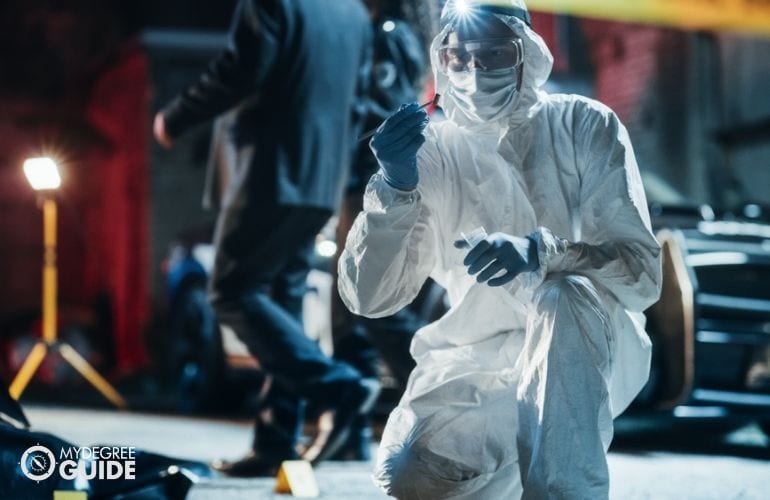
Individuals with these valuable skills are needed to collect evidence, analyze crime scenes, provide court testimony, and process evidence, among many other critical responsibilities.
Editorial Listing ShortCode:
Online forensic science degrees can be strategic for both experienced professionals looking to develop expertise in forensic science and for undergraduate students planning a career in the field.
Universities Offering Online Bachelors in Forensic Investigation Degree Programs
Methodology: The following school list is in alphabetical order. To be included, a college or university must be regionally accredited and offer degree programs online or in a hybrid format.
Colorado Technical University
Colorado Technical University offers an online Bachelor of Science in Criminal Justice – Forensic Investigation. The school’s Fast Track exams offer the opportunity to earn credit for prior knowledge. Potential courses include Ethics in Criminal Justice, Law Enforcement Operations and Report Writing, and Introduction to Homeland Security.
Colorado Technical University is accredited by the Higher Learning Commission.
Columbia College
Columbia College offers an online Bachelor of Arts in Criminal Justice with a Forensic track. The student-centered curriculum emphasizes hands-on learning. Faculty typically have real-world experience and are able to provide career advice. Graduates may pursue careers as airport security guards, police officers, special agents, or victim advocates.
Columbia College is accredited by the Southern Association of Colleges and Schools Commission on Colleges.
Columbia Southern University
Columbia Southern University offers an online BS in Forensic Investigation. The curriculum aims to teach forensic techniques and legal aspects of the field. Potential courses include Cybersecurity Law and Policy, Race and Ethnic Relations, Criminal Law, and Judicial Process.
Columbia Southern University is accredited by the Southern Association of Colleges and Schools Commission on Colleges.
Concordia University – Wisconsin
Concordia University – Wisconsin offers a Bachelor of Arts in Public Service – Management of Criminal Justice. The program features opportunities to participate in internships and applied projects. Potential courses include Ethics in Justice and Service, Public Finance and Budgeting, Crisis and Emergency Management, and Forensic Investigation.
Concordia University – Wisconsin is accredited by the Higher Learning Commission.
Liberty University
Liberty University offers a BS in Criminal Justice – Crime Scene Investigation. The program can typically be completed in 3.5 years. Classes are 100% online and are 8 weeks long. Potential courses include Criminal Investigations I, Crime Scene Management, and Crime Scene Photography.
Liberty University is accredited by the Southern Association of Colleges and Schools Commission on Colleges.
National University College
National University College offers a Bachelor’s in Criminal Justice with a major in Forensic Investigation that can typically be completed in 3 years. Potential courses include Criminal Investigation, Classification and Processing of Fingerprints, and Research and Analysis of Post Mortem Examinations. The program is available online.
NUC is accredited by the Middle States Commission on Higher Education.
Pennsylvania Western University – California
Pennsylvania Western University – California offers the opportunity to earn a BS in Criminal Justice with a Forensic Investigation concentration. The curriculum typically includes mock crime scene investigations to build hands-on skills in collecting and analyzing different types of physical evidence. Classes are commonly taught by faculty with real-world investigative experience.
PennWest California is accredited by the Middle States Commission on Higher Education.
University of La Verne
The University of La Verne offers a BS in Criminal Justice and Criminology for those planning to pursue a career in law enforcement or a related field. Potential courses include Forensic Investigations, Sociology of Deviance, Political Economy of Crime, and Social Class and Inequality. The degree may be completed entirely online.
The University of La Verne is accredited by the Senior College Commission of the Western Association of Schools and Colleges.
University of Wisconsin – Platteville
The University of Wisconsin – Platteville offers the opportunity to earn a BS or a BA in Criminal Justice with an emphasis on either Corrections or Law Enforcement. The program is available in a flexible, fully online format. Graduates may pursue careers as detectives, police officers, parole officers, or private investigators.
UW-Platteville is accredited by the Higher Learning Commission.
Washburn University
Washburn University’s Bachelor of Criminal Justice in Forensics Investigations aims to provide both classroom and practical learning experiences. The curriculum typically involves courses that analyze mock crime scenes to simulate using real-world tools and equipment. Internship opportunities may be available with the Kansas Bureau of Investigation. Courses are available both online and on campus.
Washburn University is accredited by the Higher Learning Commission.
Online Forensic Investigation Degrees

Earning a crime scene investigation degree online is beneficial for students who want to contribute to the criminal justice system by collecting, preserving, and analyzing evidence.
Students who are successful in this field tend to be detail-oriented and have strong problem-solving and critical-thinking skills. Strong science and math skills will likely be necessary for students interested in processing evidence in a laboratory environment.
Many professions require strong communication skills, especially those like forensic psychology that require professionals to testify in court or relay scientific information to others.
While the exact curriculum will vary by program, some of the essential topics covered in an investigative forensics degree include:
- Criminalistics
- Field investigation
- Sociology
- Forensic photography
- Psychology
- Fingerprint identification
- Biological evidence
- Cyber crimes
- Toxicology
- Internet and network security
- Criminal court processes
- Law of evidence
- Principles of digital forensics
- Criminology
In addition to collecting and processing various types of evidence, you can learn how evidence is used in court and the role of psychology in studying criminal behavior.
Many forensic science programs also teach students fundamental knowledge of the court system, criminal procedure, and Constitutional law. You can also become familiar with the latest technologies in forensic science, including digital technology and tools needed to process crime scenes.
One advantage of a forensic investigation major is the wide range of career opportunities and industries that need professionals with these unique skills. Careers that graduates may pursue include forensic science technicians, fingerprint analysts, forensic accountants, private detectives, government investigators, and police detectives.
Forensic Investigation Careers & Salaries
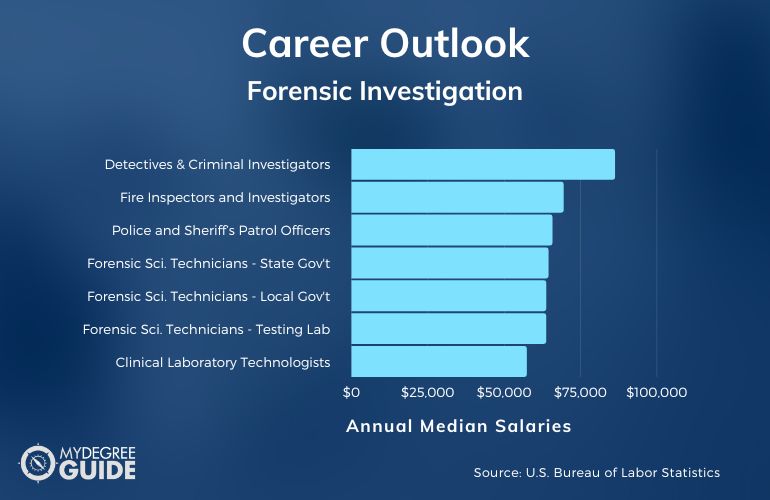
Graduates who have successfully earned their crime scene investigation degree online can pursue a wide range of career opportunities.
Forensic skills are needed for the collection and analysis of evidence in a wide range of areas, including accounting, nursing, wildlife management, insurance, and psychology. Individuals interested in working in the field at crime scenes may pursue opportunities as crime scene or forensic science technicians.
According to the Bureau of Labor Statistics, here are the median salaries of potential career paths related to forensic science and criminal investigation.
| Careers | Annual Median Salaries |
| Detectives and Criminal Investigators | $86,280 |
| Fire Inspectors and Investigators | $69,450 |
| Police and Sheriff’s Patrol Officers | $65,790 |
| Forensic Science Technicians — State Government | $64,500 |
| Forensic Science Technicians — Local Government | $63,750 |
| Forensic Science Technicians — Testing Laboratories | $63,730 |
| Clinical Laboratory Technologists and Technicians | $57,380 |
| Private Detectives and Investigators | $52,120 |
| Biological Technicians | $49,650 |
| Forensic Science Technicians — Medical and Diagnostic Laboratories | $42,600 |
Professionals can also use these forensic science skills as detectives, government agents, military investigators, and private detectives.
Those interested in analyzing evidence can develop expertise in areas like fingerprint, firearms, or blood pattern analysis. There is also a need for professionals who can investigate financial crimes and work in forensic accounting.
Forensic Investigation Bachelor’s Curriculum & Courses

While exact courses will vary by program, listed below are examples of courses you may take as part of your investigative forensics degree:
- Criminology: You’ll examine crime and causes of criminal behavior with topics including social policy, prevention, rehabilitation, and key causal factors.
- Introduction to Corrections: This course introduces you to the corrections system, including probation, parole, and offender punishment and treatment.
- Introduction to Court Security: Students in this course will examine court security and explore methods of preventing violence in court facilities.
- Policing: This course covers numerous facets of American policing, including police origins, the organization structure, community policing, and the future of policing.
- Criminal Investigation: You’ll examine the history of investigative techniques and procedures to present, including current forensic science capabilities.
- Crime Scene Investigation: This course introduces you to the techniques required for gathering evidence and using laboratory analysis in criminal investigations.
- Principles of Digital Forensics: You’ll study digital forensic procedures, including how to gather digital information and the legal implications of these crimes.
- Forensic Psychology: This course examines the psychology of criminal behavior, including psychological theories, perspectives, and treatment.
- Law of Evidence: You’ll examine the judicial nature of evidence, including the statutory law of evidence and procedural evidentiary rules.
- Fire Investigation and Analysis: This course examines fire and explosion investigation and analysis, including fire ignition and spread.
In addition to forensic investigation major courses, you will also take general education courses in subjects like math, English, and history.
Admissions Requirements

While admissions requirements vary by school, listed below are some common requirements for pursuing a crime scene investigation degree online:
- Official transcripts. Most programs require your official transcripts from high school and any college courses you have taken.
- Minimum GPA. Some programs require a minimum GPA from your high school courses.
- Background check. Some programs require applicants to complete and pass a background check.
In addition to the above, most programs require you to complete an online application and pay an application fee.
Accreditation

As you look into schools that offer online forensic science degrees, one factor to consider is the school’s accreditation status.
Schools with regional accreditation are the most widely accepted, and their programs have been verified as meeting agreed-upon educational standards. Many employers, especially in technical jobs like forensic science, only hire individuals with degrees from accredited schools.
To learn more about regional accreditation, you can visit the US Department of Education’s website.
Accreditation for Forensic Science Programs
In addition to a school being regionally accredited, forensic science programs can be accredited by the Forensic Science Education Programs Accreditation Commission (FEPAC).
FEPAC provides national standards for forensic science education and is the programmatic accreditation for forensic science programs at the undergraduate and graduate levels. For schools that are already regionally accredited, FEPAC can evaluate and verify that the school’s forensic science programs meet their accreditation standards.
Financial Aid and Scholarships

While you explore options for earning your online criminal justice degree, you can also explore options to help with the upfront costs of your program.
There are numerous scholarship opportunities you can explore, from scholarships offered through schools to those funded by public and private institutions. You can also explore financial aid opportunities offered through the government, including loans, grants, and work-study programs. Some financial aid options, like Pell Grants, are earmarked specifically for undergraduate students.
To learn more about federal aid and the kinds of opportunities that may be available, you can visit the Federal Student Aid website.
What Is a Forensic Investigation Degree?
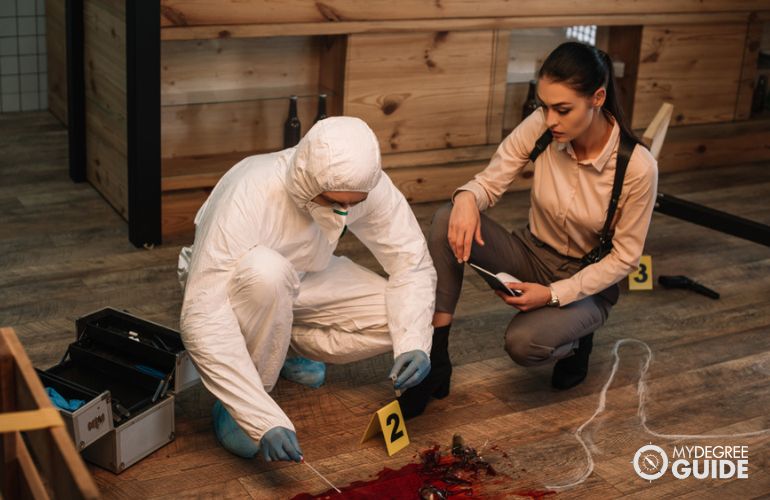
A forensic investigation degree is a bachelors program that helps prepare students to enter professions where they need to collect, preserve, and analyze evidence. Students who major in forensic investigation explore various aspects of the criminal justice system, including the court system, corrections, and the role of psychology in forensics.
Through studying forensic analysis, students can learn to discern what critical and relevant evidence is and how to preserve and present evidence for legal use. Graduates are often prepared to utilize their forensic investigation skills in a wide variety of careers and industries.
What Can You Do with a Forensic Investigation Degree?
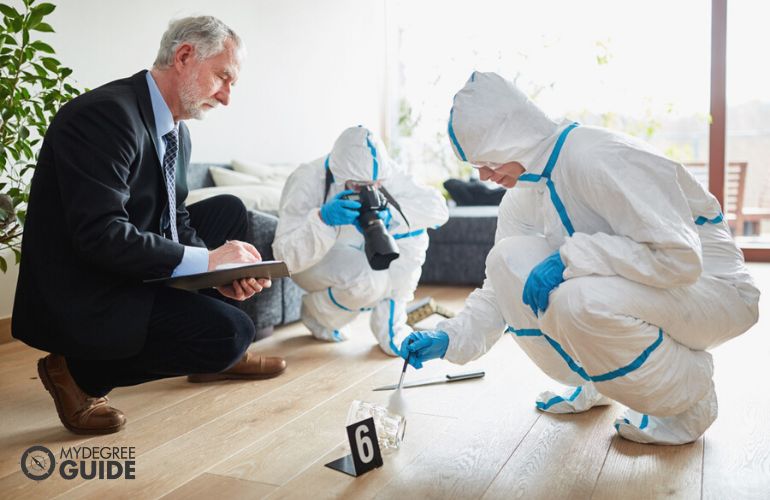
Graduates with an investigative forensics degree may pursue opportunities in numerous industries, including with government and law enforcement agencies.
Many graduates pursue opportunities as crime scene technicians—collecting, analyzing, and preserving evidence used in criminal investigations. Graduates can also use their analytical skills in other niches, including blood pattern, fingerprint, and firearms analysis. Students interested in the psychological aspects of criminal behavior can look into graduate programs in forensic psychology.
These are just a few ways individuals may use online forensic science degrees. Other opportunities include forensic accounting, crime scene photography, and forensic nursing.
How Long Does It Take to Get a Bachelor’s in Forensic Investigation Degree Online?

The time needed to complete a major in forensic investigation will vary depending on a few factors, including your enrollment status and the program’s schedule.
If your program follows a traditional 16 week semester and you attend classes full-time, completing your investigative forensics degree will likely take 4 years. If your program follows an 8 week semester and you are enrolled year-round, including during the summer, you may be able to finish your degree in less time.
Is a Bachelors in Forensic Investigations Degree Worth It?
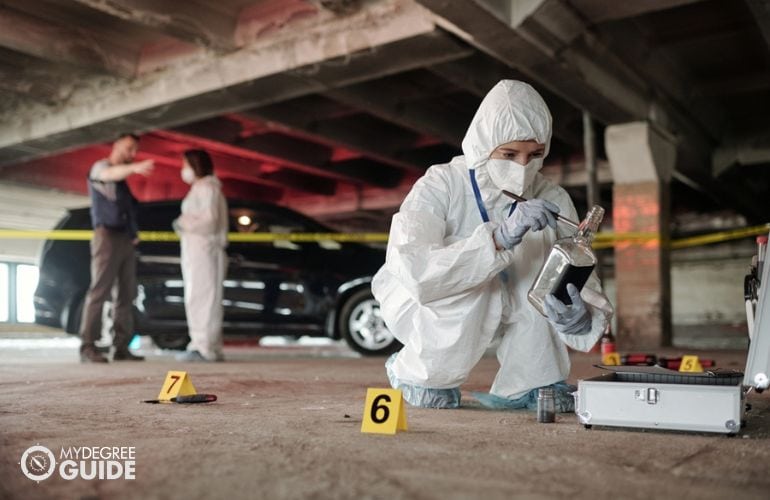
Yes, a bachelors in forensic investigations degree is worth it for many students. This degree path is beneficial for those starting a career in forensic science or looking to expand their career opportunities in this field.
Professionals with forensic skills are needed in various industries, including government agencies, insurance companies, law enforcement, and social service agencies. Based on data from the Bureau of Labor Statistics, positions for forensic science technicians are projected to grow 11% over the next ten years, which is much faster than the average for all occupations.
Getting Your Bachelor Degree in Forensic Investigation Online

Earning an investigative forensics degree can help you develop the unique skills and knowledge needed to pursue a career in this innovative field.
As it’s a critical component of our justice system, there will always be a need for individuals who can properly collect and process evidence. Graduates can also find opportunities to combine these skills with various industries, including psychology, finance, insurance, technology, and wildlife management.
If you want to enter the exciting and cutting-edge field of forensic science, you can start by looking into online forensic science degrees from accredited institutions.
